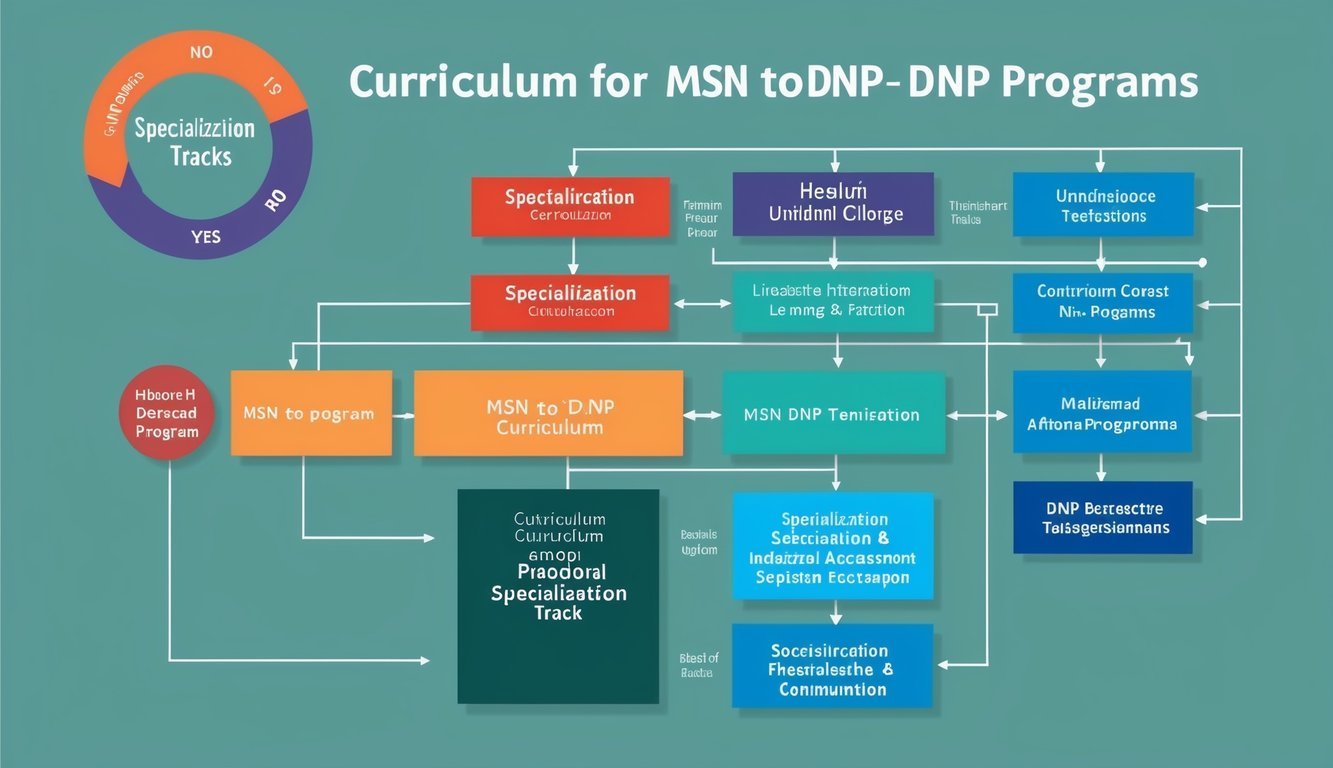The healthcare landscape is evolving, and many nursing professionals seek advanced degrees to enhance their careers. MSN to DNP programs provide a pathway for you to transition from a Master of Science in Nursing to a Doctor of Nursing Practice.
These programs equip you with the skills needed for leadership and advanced clinical roles.
They cater to your professional growth by expanding your knowledge in evidence-based practice, health policy, and quality improvement.
Completing an MSN to DNP program allows you to integrate your clinical expertise with a deeper understanding of healthcare systems.
You’ll engage in rigorous coursework and clinical experiences that prepare you to tackle complex challenges in nursing practice.
With an emphasis on leadership and applied research, you position yourself to significantly impact patient care and healthcare delivery.
Choosing the right MSN to DNP program can be daunting, but options are available online and on-campus, offering flexibility to fit your lifestyle.
Whether you aim to specialize in a particular area or enhance your overall nursing practice, exploring these programs can lead you to the next step in your nursing career and open doors to new opportunities.
Understanding the MSN to DNP Pathway
The transition from a Master of Science in Nursing (MSN) to a Doctor of Nursing Practice (DNP) represents a significant advancement in your nursing career.
This pathway emphasizes both clinical practice and leadership, equipping you with the skills necessary for expanded roles within healthcare.
Defining the DNP Credential
The Doctor of Nursing Practice (DNP) is a terminal degree focused on clinical practice rather than academic research.
This credential signifies that you have completed advanced education in nursing, preparing you for leadership roles in various settings.
DNP programs often cover areas like healthcare policy, evidence-based practice, and organizational leadership.
You can expect training that enhances your ability to influence patient outcomes and healthcare systems.
Key aspects of the DNP credential include:
- Clinical Expertise: A focus on advanced clinical skills.
- Leadership Development: Training in managing healthcare teams and systems.
- Impact on Policy: Preparation to engage in healthcare policy-making.
This degree opens doors to roles such as Clinical Nurse Specialist or Nurse Educator.
Benefits of Advancing from MSN to DNP
Transitioning from an MSN to a DNP offers numerous benefits that impact your career and the healthcare landscape.
One of the primary advantages is access to higher-level job opportunities.
As an Advanced Practice Registered Nurse (APRN), you can specialize in areas such as family medicine or geriatrics.
Key benefits include:
- Enhanced Clinical Skills: Deeper knowledge in clinical areas and evidence-based approaches.
- Leadership Opportunities: Skills to lead interdisciplinary teams effectively.
- Greater Earning Potential: DNP-prepared nurses typically earn higher salaries compared to those with only an MSN.
The MSN to DNP pathway aligns with current trends in healthcare, emphasizing the need for highly educated nursing professionals equipped to improve patient care and outcomes.
Exploring programs that fit your needs can lead you towards a fulfilling career in nursing.
For more details, consider resources like the University of St. Augustine for program information.
Admission Requirements and Application Process

Understanding the admission requirements and application process for MSN to DNP programs is crucial for prospective students.
This section outlines key prerequisites, essential documents, and the steps you need to take to prepare your application.
Academic Prerequisites
To apply for an MSN to DNP program, you typically need to hold a Master of Science in Nursing (MSN) degree from an accredited institution.
Most programs require a minimum cumulative GPA of 3.0 on a 4.0 scale.
Some institutions may have additional prerequisites, such as specific coursework in nursing informatics or health policy.
Check the specific requirements of each program, as they can vary significantly.
For instance, Francis Marion University specifies that candidates must complete a Graduate Studies online application.
Meeting these academic standards is essential to strengthen your application.
Professional Experience
Clinical experience is another critical factor.
Programs usually prefer applicants with hands-on nursing experience, especially those who have worked in advanced practice roles like Nurse Practitioners or Nurse Midwives.
Some programs may request a minimum number of practice hours, while others focus more on your role and scope of practice.
Documentation of licensure as a Registered Nurse (RN) is required, along with a summary of your professional experiences.
This information helps demonstrate your capability and readiness for doctoral-level study.
Letters of Recommendation
Typically, you need 2 to 3 letters of recommendation from individuals who can comment on your professional capabilities and readiness for graduate study.
These recommenders could be supervisors, colleagues, or faculty members from your MSN program.
When selecting recommenders, choose individuals who know your work ethic and skills.
Their insights can significantly influence your application.
A well-written recommendation will highlight your competencies related to nursing informatics, leadership, and health policy, enhancing your profile.
Personal Statement
The personal statement is a vital component of your application.
This narrative allows you to express your motivations for pursuing a DNP, your career goals, and how the program aligns with your professional aspirations.
Focus on your commitment to nursing and any unique perspectives you may bring to the field.
Highlight experiences that shaped your goals in nursing practice and your vision for addressing healthcare challenges.
Tailor your personal statement to reflect the ethos of the specific program you are applying to, showing that you understand their focus areas and values.
Curriculum and Specialization Tracks

The curriculum of MSN to DNP programs includes a blend of core courses and specialized tracks.
You have the option to focus on areas that align with your career goals, along with meeting clinical requirements essential for practice.
Core DNP Courses
Core DNP courses typically cover essential topics like Evidence-Based Practice, Health Policy, and Quality Improvement.
You will engage in courses that enhance your knowledge in biostatistics, offering you the tools to analyze healthcare data effectively.
A standard curriculum framework may include:
| Course Title | Description |
|---|---|
| Evidence-Based Practice | Focuses on integrating research into clinical settings. |
| Health Policy Leadership | Examines policies affecting healthcare and patient outcomes. |
| Biostatistics | Teaches statistical methods for health research. |
| Quality Improvement | Explores strategies to enhance patient care and safety. |
These courses prepare you for advanced roles in nursing practice.
Specialty Track Options
Specialty tracks allow you to tailor your education based on professional interests.
Options may include tracks for Nurse Practitioners (NP), Nurse Anesthetists, or Clinical Nurse Specialists.
Depending on the program, you may choose one of the following pathways:
- Family Nurse Practitioner (FNP)
- Psychiatric Mental Health Nurse Practitioner (PMHNP)
- Nurse Anesthesia
Each track involves a unique set of coursework, allowing you to build expertise in specific areas of patient care.
Clinical and Residency Requirements
The completion of clinical hours is a crucial component of DNP programs.
You must fulfill a set number of practicum hours, often totaling 1,000, which can vary by track and previous experience.
Your clinical practice might include:
- Direct patient care
- Health assessments
- Leadership experiences
Residency experiences provide the opportunity to apply your academic knowledge in real-world settings, enhancing your understanding of holistic patient care and preparing you for the complexities of advanced practice nursing.
Financial Considerations and Support

When pursuing an MSN to DNP program, understanding financial considerations is crucial.
This includes evaluating tuition and fees, exploring financial aid options, and assessing the return on investment.
Tuition and Fees
Tuition for online MSN to DNP programs varies widely depending on the institution.
On average, you can expect to pay between $600 and $1,200 per credit hour.
Additional costs such as registration fees, technology fees, and materials may also apply.
| Institution Type | Average Tuition per Credit Hour |
|---|---|
| Public Schools | $600 – $1,000 |
| Private Schools | $800 – $1,200 |
Make sure to review each program’s specifics, as some institutions offer competitive rates for in-state students or flat rates for online programs.
It’s essential to factor in the total credit requirements for your degree when calculating overall costs.
Financial Aid and Scholarships
Exploring financial aid options can significantly reduce your educational expenses.
Many institutions offer scholarships specifically for nursing students pursuing advanced degrees.
Federal financial aid, including grants and loans, is also available.
Consider applying for:
- Federal Direct Subsidized Loans
- TEACH Grants for individuals willing to teach in high-need areas
- Institutional Scholarships specifically for MSN to DNP students
To maintain eligibility for financial aid, complete the FAFSA (Free Application for Federal Student Aid) annually.
This process will help you determine available grants, scholarships, and loan options.
Return on Investment
Evaluating the return on investment (ROI) is essential for your financial planning.
A DNP degree may lead to higher earning potential and career advancement opportunities.
On average, DNP-educated nurses earn approximately $10,000 to $20,000 more per year than those with an MSN.
Consider factors such as job placement rates and employment projections in your field when assessing potential ROI.
Utilizing resources such as industry salary surveys and career services can assist in understanding the financial benefits of your investment in a DNP program.
Professional Outcomes and Career Advancement

Transitioning from an MSN to a DNP program significantly enhances your professional trajectory in nursing.
Graduates of these programs open doors to expansive career opportunities, assume leadership roles, and positively influence healthcare quality and policy.
This advancement is crucial for addressing the evolving challenges within the healthcare sector.
Career Opportunities for DNP Graduates
As a DNP graduate, you will find yourself well-equipped for diverse career paths.
Within the clinical setting, roles like Nurse Practitioner and Clinical Nurse Specialist are prominent.
These positions allow you to provide advanced patient care and assume a pivotal role in treatment planning.
Other opportunities include leadership positions in Healthcare Management and Nursing Leadership.
DNP holders can also explore careers in health systems leadership and clinical education, where they influence nursing practices and contribute to educational programs.
Examples of Career Roles:
- Nurse Educator
- Healthcare Policy Analyst
- Director of Nursing
Leadership and Management Roles
DNP programs prepare you for impactful roles in Organizational and Systems Leadership.
These positions require skills in strategic planning, resource allocation, and team management, all essential for effective healthcare delivery.
Impact on Healthcare Quality and Policy
Your transition to a DNP can lead to substantial contributions in Healthcare Policy and quality improvement initiatives.
DNP graduates often engage in research and implementation of evidence-based practices that enhance patient safety and care standards.
Moreover, your involvement in policy-making at various levels can lead to influential healthcare reforms.
As you spearhead initiatives that align with healthcare management strategies, you help shape the future landscape of healthcare delivery and improve overall system efficiencies.
Through these roles, you not only advance your career but also play a critical part in elevating healthcare standards for the communities you serve.

